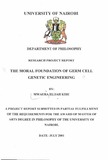The moral foundation of germ cell genetic engineering

View/
Date
2001-07Author
Mwaura, Elijah K
Type
ThesisLanguage
enMetadata
Show full item recordAbstract
This is a multidisciplinary study. It integrates medical ethics and the emerging biomedical
technology of Recombinant DNA. The study sets out to investigate, and attempts at resolving, the
controversy surrounding the ethical foundation of the biotechnology of germ cell genetic
engineering. The contention in this study is that the persistence of the moral controversy is due to
the lack of an appropriate ethical framework of analysis which is in tandem with the practice, and
aims of the germ cell genetic engineering.
This study sets out to examine the ethically relevant grounds that can necessitate and justify
the application of germ cell genetic engineering technology in the process of human reproduction.
The methodology adopted in this study is critical and analytical inquiry. Focusing on the
secondary data obtained from the library research, a critical analysis and argumentation has been
used in order to determine and evaluate the meaning, underlying assumptions, implications and
justifications of the stand taken. The stand taken is that the ethical foundation of germ cell genetic
engineering is that of quality-of-life ethic.
Setting the inquiry within the pragmatic consequentialist ethical approach; the argument
advanced focuses on the goal of attaining liappiness. This is possible when leading a quality life. In
this respect germ cell genetic engineering with its immense benefits and assurance of quality life is
viewed as morally necessary and justified. The findings of the study show that the moral value to be
derived from the utility of genetic engineering outweighs the moral evils.
In paving the way for an ethical discussion, the study exposes the invalidity of the a prior
and a posterior objections leveled against germ cell genetic engineering. This is after analyzing
them under a posterior pragmatic ethical framework The a prior objections are dismissed as
morally insignificant as they are metaphysical and empirically indemonstrable. Whenever they are
appealed to in ethics they kill the argument there and then. However, ethics is not absolutist. The a
posterior objections are also dismissed as an informed public policy framework in a democratic and
liberal society can adequately address them.
Principally the right to, and the obligation to ensure, a normal opportunity for health to every
possible child is a utilitarian requirement of human obligation. This utilitarian obligation dictates to
the current generation, as individuals who are morally responsible, to do that which is possible to
ensure posterity's attainment of quality life. As such controversial issues like discarding the germ
cells, aborting or refraining from procreation are morally praiseworthy.
The findings of this study exposes the opposition to the possibility of moral acceptance of
germ cell genetic engineering in the human reproduction process is due to the unsuitability of the
currently domineering ethical approach. This is attested to by the exposure of two dominant but
radically opposed ethical frameworks that are usually called forth in the assessment of the morality
of germ cell genetic engineering.
The sanctity of life is metaphysical, a prior, absolute and empirically indemonstrable in
medical ethics. The quality of life concept is empirical, pragmatic, and based on differences of
relatives of the person's quality of life. The quality of life super-cedes the sanctity of life by its
recognition of the varying worth of human life thus enabling the meritorious treatment of each
clinical case. This is vital as it avoids the hypocrisy, contradictions, difficulties and absurdities that
mark the sanctity of life ethical doctrine. The practice and the aims of germ cell genetic engineering
are geared towards the attainment of quality of life. Therefore the quest for quality life emerges as a
moral ground for defending germ cell genetic engineering.
The study recommends inter alia a change of ethical attitude to enable a wider acceptance of
germ cell genetic engineering. It also recommends the enactment of guidelines and more societal
participation to curb the misuse of germ cell genetic engineering technology .
Citation
Masters thesis University of Nairobi (2001)Publisher
University of Nairobi Department of Philosophy
